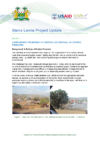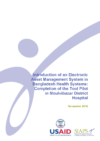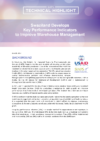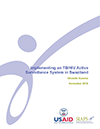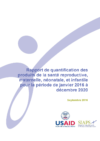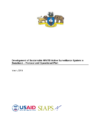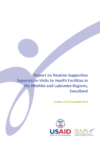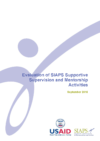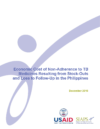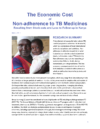SIAPS joined those involved in supply chain management in Sierra Leone to collaborate on a plan to handle products for reverse logistics and proper disposal. The turnkey activity of segregating, sorting, documenting, packing and preparing for collection by the district medical stores is part of the technical assistance the SIAPS Project supports in the country; namely, establishing … Read more
In Bangladesh, the government health facilities face a wide variety of health-related challenges and the Ministry of Health and Family Welfare (MOHFW) must have reliable and timely data on the performances of different parts of the health system to plan, implement, and measure health interventions. Even though the MOHFW procures a large number of medical … Read more
In 2014, SIAPS supported the Ministry of Health (MOH), Central Medical Stores (CMS), and Swaziland Health Laboratory Services (SHLS) by conducting a workshop to build capacity and improve performance of staff that works in warehouse operations. The Imperial Health Services warehouse was used as a model to showcase warehousing best practices.
SIAPS supported the Swaziland Ministry of Health (MOH) in mobilizing key stakeholders from the Swaziland National AIDS Program and the National Tuberculosis Control Program to introduce and implement an active surveillance system for patients on ARVs and anti-TB treatment. SIAPS provided technical assistance to MOH’s National Pharmacovigilance Unit (NPVU) to develop the protocol and tools to implement … Read more
L’accès à des médicaments appropriés est vital pour parvenir aux objectifs mondiaux en matière de santé, en particulier les produits destinés pour la santé de la femme et de l’enfant. Un élément majeur de l’accès est de garantir la disponibilité des produits. Pour cela, la quantification des besoins est indispensable. La présente activité a apporté un … Read more
A Bayoko, C Touré, DM Touré, M Doumbia, Mali, Quantification, Reproductive Maternal Newborn and Child Health, S Berthé, SM Kone, Supply chain management, Technical Report, Y Coulibaly
A pharmacovigilance system, through active surveillance in sentinel sites, is proposed to monitor the safety and tolerability of antiretroviral medicines (ARV) and anti-tuberculosis (TB) medicines at antiretroviral treatment (ART) clinics and TB clinics in Swaziland. The goal of this activity is to develop, implement, and demonstrate the local feasibility of a practical and sustainable pharmacovigilance … Read more
Since October 2015, SIAPS has been supporting hospitals, health centers, and high volume clinics at the request of regional implementing partners in the Hhohho and Lubombo regions. This report documents the support that facilities have received, progress made, and recommendations for future support.
This report presents highlights of SIAPS’ work to capacitate health workers on proper pharmaceutical service delivery and stock management over a four-year period (2012 to 2015). SIAPS did a baseline assessment at health facilities (HF) in 2012, and then from 2013 to 2015, its technical advisors provided assistance to address the identified performance gaps. The … Read more
A key element of successful tuberculosis (TB) control programs is adherence to treatment. Non-adherence results in increased length and severity of illness, death, disease transmission, and drug resistance. The purpose of this study was to estimate the morbidity and mortality impact and economic costs of non-adherence to TB medicines resulting from treatment interruption due to … Read more
One of the key elements of successful tuberculosis (TB) control programs is adherence to treatment, which is a cornerstone of most international and national policies and guidelines. Non-adherence results in increased length and severity of illness, death, disease transmission, and drug resistance. Treatment interruption is often due to patient-related factors—classed as loss to follow-up (LTFU)—but … Read more
